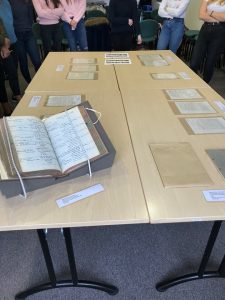Sara Sullam is Assistant Professor of English Literature at the University of Milan. She spent her six-month Visiting Fellowship funded by the British Academy at our Department. In this blog post she tells us what she discovered in the University’s Special Collections.
In her 1925 essay on “How Should One Read a Book” Virginia Woolf reflected on the fact that the very act of reading was always, in a way, taken for granted, while it in fact deserves further scrutiny and attention: “For though reading seems so simple – a matter of knowing the alphabet – it is indeed so difficult that it is doubtful anyone knows anything about it”. Research on reading has undoubtedly progressed since then: however, much remains to be discovered on how reading habits are formed and on how our experience of reading across languages and cultures is shaped.
Funded by a Visiting Fellowship of the British Academy hosted by the Department of Modern Languages and European Studies under the supervision of Dr Daniela La Penna, my project British Novels for European Readers, European novels for British Readers: A Working Hypothesis for the Anglo-Italian Case (1945-1965) has investigated the crucial function of publishing for the development of reading culture in a key moment in the history of European integration. In particular, it has focused on the strategies devised by Italian and British publishers to select, evaluate, translate, promote and market fiction from 1945 to the mid-Sixties. Who were the people involved in these processes? What was their way of reading? And how did it impact on the way the common reader in both countries made sense of fiction coming from abroad?
To address these research questions, I literally plunged in the incredible wealth of materials of the Archives of British Publishing and Printing housed at the University of Reading’s Special Collections. I read the correspondence between English and Italian publishers – Chatto & Windus, The Hogarth Press, Jonathan Cape, The Bodley Head on this side of the Channel, Mondadori, Feltrinelli, Einaudi in Italy. I studied the reports written by professional readers, key actors in the process of literary transfer, whose work has very often remained buried in the archives. I was able to see how much is gained, and not lost, in translation. Working on these papers has made literature come alive.
Illuminating the transnational networks of people who shaped the availability of post-war European novels in the British and American markets has also inspired the research practice underpinning the project, aimed at building research networks across disciplines and languages. Besides funding a number of presentations of the project at other UK universities (Manchester, Nottingham), the BA grant allowed me to co-organize with my host Daniela La Penna an international conference (https://readingconference.home.blog/) that brought together publishing historians, scholars of Italian and English literature, from Italy, Germany, the US and the United Kingdom. The conference gave us all the opportunity to reflect on the networks of the past to build the research networks of the future.
Sara Sullam


